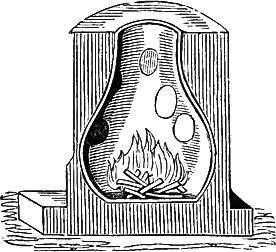The Future of Bible Study Is Here.
Sign in or register for a free account to set your preferred Bible and rate books.
Furnace—(1.) Chald. attun, a large furnace with a wide open mouth, at the top of which materials were cast in (Dan. 3:22, 23; comp. Jer. 29:22). This furnace would be in constant requisition, for the Babylonians disposed of their dead by cremation, as did also the Accadians who invaded Mesopotamia.
(2.) Heb. kibshan, a smelting furnace (Gen. 19:28), also a lime-kiln (Isa. 33:12; Amos 2:1).
(3.) Heb. kur, a refining furnace (Prov. 17:3; 27:21; Ezek. 22:18).
(4.) Heb. alil, a crucible; only used in Ps. 12:6.
(5.) Heb. tannur, oven for baking bread (Gen. 15:17; Isa. 31:9; Neh. 3:11). It was a large pot, narrowing towards the top. When it was heated by a fire made within, the dough was spread over the heated surface, and thus was baked. “A smoking furnace and a burning lamp” (Gen. 15:17), the symbol of the presence of the Almighty, passed between the divided pieces of Abraham’s sacrifice in ratification of the covenant God made with him. (See OVEN.)

SECTION OF OVEN FOR BAKING BREAD (tannûr).
(From Niebuhr.)
(6.) Gr. kamnos, a furnace, kiln, or oven (Matt. 13:42, 50; Rev. 1:15; 9:2).

|
About Easton’s Bible DictionaryEaston’s Bible Dictionary provides informative explanations of histories, people and customs of the Bible. An excellent and readily understandable source of information for the student and layperson. One of Matthew George Easton’s most significant literary achievements. |
| Support Info | eastons |
 Loading…
Loading…